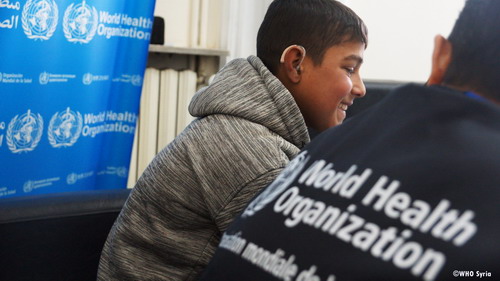 Khaled after receiving the cochlear device. Photo: WHO Syria 2019
Khaled after receiving the cochlear device. Photo: WHO Syria 2019
30 January 2019, Damascus, Syrian Arab Republic – 14-year-old Khaled lives with his mother and 3 brothers in eastern Ghouta, Rural Damascus. His father died 5 years ago, leaving his family with very little. Following his father’s death, Khaled and his family lived through some of the darkest days of the conflict. The situation was even more distressing for Khaled, who suffers from congenital hearing loss. When his hearing aid broke 5 years ago, his mother could not afford the cost of a replacement. Khaled has lived in a world of silence ever since, unable to communicate with others and they unable to communicate with him.
“When Khaled’s hearing aid broke, his teacher didn’t know how to deal with him, so she asked him to sit at the back of the class,”, said his mother. “He was always sitting on his own, and one by one his schoolmates abandoned him. He felt lonely and isolated and eventually he refused to go back to school.”
Khaled’s mother grew increasingly desperate, and asked everyone she knew how she could get help for her son. One of her friends told her about Tamayoz Social Care Association, one of the many nongovernmental organizations (NGOs) in Syria supported by WHO that treat patients for free.
Doctors at Tamayoz examined Khaled and implanted a cochlear device. The effect was immediate: the formerly withdrawn adolescent was able to hear again and interact with his peers. Dr Mohamad Abu Alhassan, his physician at Tamayoz, said that Khaled would eventually be able to live a normal life. “Khaled has regained his confidence, and we hope he will go back to school soon. He will need intensive therapy to recover his speech, but we will continue to treat him and give him the support he needs,” said Dr Alhassan.
“WHO’s NGO partners in Syria play an essential role providing primary health care services to some of the most vulnerable people in the country”, said Ms Elizabeth Hoff, the WHO representative in Syria. “We have established partnerships with dozens of NGOs that are providing health care services in most governorates. We are committed to working with our NGO partners to expand health care services throughout the country.”
In 2018, the Tamayoz Social Care Association supported more than 61 000 displaced people in Damascus and Rural Damascus. WHO’s support to Tamayoz was made possible by the contributions of several donors, including the Government of Japan and UK Aid.




